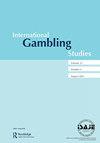Prevalence and correlates of gambling disorder in Spain: findings from a national survey
IF 1.8
3区 心理学
Q2 SUBSTANCE ABUSE
引用次数: 0
Abstract
ABSTRACTThe aim of the study was to estimate the prevalence of gambling disorder (GD) in a sample of Spanish adults and analyze the sociodemographic variables, addictive behaviors (i.e. gambling-related characteristics, substance use, and problematic internet use), and lifetime clinical diagnoses related to the severity of GD. Participants from the 2020 Spanish Survey on Alcohol and Drugs (N = 17,105; 50.52% men; Mage = 38.38 ± 13.07) were included. Individuals were classified as gamblers with GD when scored ≥4 points in the DSM-5 criteria. ANOVA and Pearson correlations were carried out to analyze differences in GD scores according to the variables noted above. The results showed that the rate of GD was 0.63% in the total sample and 1.05% in past-year gamblers. Characteristics which showed significantly higher GD scores were as follows: being a man, younger age, unmarried, greater gambling involvement both online and offline, gambling both online and offline, betting on both strategic and non-strategic games or on exclusively strategic games, lower gambling risk perception, greater substance use, higher problematic alcohol, cannabis, or internet use, or a lifetime diagnosis of anxiety, insomnia, or substance use disorder (all p-values ≤.001). The findings may guide future legal regulation policies and promote actions to prevent gambling-related problems.KEYWORDS: GamblingprevalencecorrelatesSpanish adultssubstance useinternet use AcknowledgementsThe authors would like to thank the Spanish National Drugs Plan (Ministry of Health, Social Services and Equality) for providing the survey data.Disclosure statementNo potential conflict of interest was reported by the author(s).Data availability statementThe data in this study was obtained from the 2020 Survey on Alcohol and Drugs in Spain. Such a dataset may be requested from the Spanish National Drugs Plan. Interested researchers should fill out the form available at the following link: https://pnsd.sanidad.gob.es/profesionales/sistemasInformacion/sistemaInformacion/solicitud_bases_de_datos.htm and send it in PDF format to the e-mail address cendocupnd@sanidad.gob.esSupplementary dataSupplemental data for this article can be accessed online at https://doi.org/10.1080/14459795.2023.2276747.Additional informationFundingThe work was supported by the Government of the Principality of Asturias [PA-21-PF-BP20-015].Notes on contributorsRoberto Secades-VillaRoberto Secades-Villa is a professor in the University of Oviedo and the head of the Addictive Behaviors Research Group. He has published more than a hundred scientific articles and books related to the evaluation, treatment, and prevention of addictive behaviors. He is one of the people of reference in addictions in the Spanish field as well as internationally.Andrea KrotterAndrea Krotter, MA, is a PhD candidate in the Addictive Behaviors Research Group at the University of Oviedo. During her research career has participated in various research projects about addictive behaviors and has published several scientific articles and book chapters related to this field of study. Her interest is focused on the prevention and treatment of addictive-related problems in vulnerable populations.Gema Aonso-DiegoGema Aonso-Diego, PhD in psychology and assistant professor at the University of Oviedo. She is part of the Addictive Behaviors Research Group, where she develops her research in the field of assessment, prevention, and treatment of addictive behaviors. She has participated as an author or co-author of numerous publications, including book chapters and scientific articles in specialized journals, all of them related to addictive behaviors. One of the milestones in her research career was receiving two early-career awards from national and international entities.西班牙赌博障碍的流行及其相关因素:一项全国性调查的结果
摘要本研究的目的是估计西班牙成人样本中赌博障碍(GD)的患病率,并分析社会人口学变量、成瘾行为(即赌博相关特征、物质使用和有问题的互联网使用)以及与GD严重程度相关的终生临床诊断。2020年西班牙酒精和毒品调查的参与者(N = 17,105;男性50.52%;Mage = 38.38±13.07)。当个体在DSM-5标准中得分≥4分时,被归类为患有GD的赌徒。根据上述变量进行方差分析和Pearson相关分析GD评分的差异。结果显示,总样本的GD比率为0.63%,而过往赌徒的GD比率为1.05%。表现出显著较高GD分数的特征如下:男性,年龄较小,未婚,更多地参与在线和离线赌博,在线和离线赌博,投注战略和非战略游戏或专门的战略游戏,较低的赌博风险感知,更多的物质使用,更高的问题酒精,大麻或互联网使用,或终身诊断为焦虑,失眠或物质使用障碍(所有p值≤0.001)。研究结果可以指导未来的法律监管政策,并促进防止赌博相关问题的行动。关键词:赌博流行度相关西班牙成人物质使用互联网使用致谢作者要感谢西班牙国家药物计划(卫生、社会服务和平等部)提供的调查数据。披露声明作者未报告潜在的利益冲突。数据可用性声明本研究中的数据来自西班牙2020年酒精和毒品调查。这样的数据集可以从西班牙国家药物计划请求。有兴趣的研究人员请填写以下表格:https://pnsd.sanidad.gob.es/profesionales/sistemasInformacion/sistemaInformacion/solicitud_bases_de_datos.htm,并以PDF格式发送到电子邮件cendocupnd@sanidad.gob.esSupplementary。本文的补充数据可在线访问https://doi.org/10.1080/14459795.2023.2276747.Additional informationfunding .本研究得到了阿斯图里亚斯公国政府的支持[PA-21-PF-BP20-015]。作者简介roberto Secades-Villa roberto Secades-Villa是奥维耶多大学的教授,也是成瘾行为研究小组的负责人。他发表了一百多篇关于成瘾行为的评估、治疗和预防的科学文章和书籍。他是西班牙和国际上成瘾领域的参考人物之一。Andrea Krotter,硕士,是奥维耶多大学成瘾行为研究小组的博士候选人。在她的研究生涯中,她参与了各种关于成瘾行为的研究项目,并发表了几篇与该研究领域相关的科学文章和书籍章节。她的兴趣集中在弱势群体成瘾相关问题的预防和治疗上。Gema Aonso-Diego,心理学博士,奥维耶多大学助理教授。她是成瘾行为研究小组的一员,在那里她在成瘾行为的评估、预防和治疗领域开展了研究。她以作者或合著者的身份参与了许多出版物,包括书籍章节和专业期刊上的科学文章,所有这些都与成瘾行为有关。在她的研究生涯中,一个里程碑是获得了两个来自国家和国际实体的早期职业奖。
本文章由计算机程序翻译,如有差异,请以英文原文为准。
求助全文
约1分钟内获得全文
求助全文

 求助内容:
求助内容: 应助结果提醒方式:
应助结果提醒方式:


